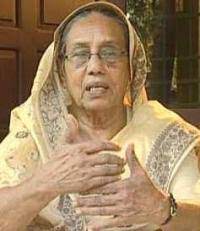In 1953, a 16-year old Muslim actress was delivering a dialogue on stage, when she was shot at. the bullet missed her and hit the stage curtains.
The man who tried to shoot Nilambur Ayisha a religious conservative who wanted to drive home a point: Muslim women shouldn’t be actors.
“It missed me and hit the stage curtains because I moved while speaking,” Ayisha, now 87, told a BBC reporter. The town of Nilambur (which became part of her stage name) is in the state of Kerala.
“It might have been the seventh or eighth staging of Ejj Nalloru Manusanakan Nokk. That shot was fired from an air gun and the bullet hit the stage. But the play continued without a break,” she reminisces. The struggle of those days is unimaginable now, she told a Malayalam news site.
“We were almost running from one stage to another on foot, with harmonium on the head. There was no payment but death threats. We were welcomed only by the communists,” she recalls.
The play spoke about the plight of Muslim lives trapped under religious doctrines and social customs, while shedding light on the farmers’ struggle against feudalism. Besides Ayamu, Ayisha’s brother Manu Muhammed, Dr M Usman and S A Jameel were the artists behind the play that was staged more than 1,000 times across the state, and in cities outside the state
Muslim conservatives tried to discourage her. But she went on acting, braving sticks, stones and slaps until, she says, “we managed to change people’s attitudes”.
Nilambur Ayisha is an actress in Malayalam movies. She was one a supporting actress in late 1960s and 1970s in Malayalam movies. She has acted in more than 50 movies. She is known for her roles in Chandrolsavam (2005), Virus (2019) and Passenger (2009).
She was born at Nilambur and was a theatre artist before becoming a cine artist. She made her film debut with Kandam Becha Kottu, the first colour film in Malayalam, in 1961. She suffered many hardships in her early years of drama acting.
It was Nilambur Aysha’s move against the opposition of Muslim orthodoxy that paved the way for several other Muslim women to take up acting and singing. Zeenath was one of the actresses she inspired.
Last month, Ayisha watched as a new generation of actors in Kerala presented a re-imagined version of the play she was doing when she was fired at – Ijju Nalloru Mansanakan Nokku (You try to become a good human being).
“It was a humane drama about bringing out the good in people and loving others regardless of their backgrounds. That is also why our troupe was targeted so many times,” she says.
The new version opens with the shooting attempt at Ayisha and, just like its earlier version, takes aim at religious conservatism among Muslims. The’21st century version’ incorporates several recent incidents of intolerance and religious dogma, especially those intended to oppress women.
Last month, a senior Muslim leader in Kerala kicked up a controversy, when he scolded the organisers of an event for calling a female student to receive an award on a stage.
“We tried to change these attitudes earlier. But now, when there is objection to a young girl going up on stage, it feels like we are going back to those dreadful days,” she says
Ayisha says she is worried that the orthodoxy and conservatism she and her fellow artistes fought against in the 1950s and 60s, is gaining ground in Kerala, often called one of India’s most progressive states.
“There were a lot of attacks on us. Muslim conservatives found it blasphemous that a woman from the community was appearing on stage,” says VT Gopalakrishnan, who played the son of Ayisha’s character in the drama.
People threw stones at Ayisha when she was acting; her colleagues were attacked when they tried to protect her.
Once, a man jumped on the stage and slapped Ayisha so hard he damaged her eardrum – it left her with a permanent hearing disability. The man who shot at her was never caught.
” My strength only increased,” Ayisha says.
Many Muslim women in India face discrimination not just from the conservative or hard-line Muslims. Since 2014, with the rise of right wing militancy in India, there is increasing polarization between communities, and attacks on Muslims have risen sharply.
In turn, the minority community is also going through a political churn where moderate voices are finding it harder to counter what is sometimes an assertion of conservative practices in the name of championing religious identity.
The family of 27 year old Bharatnatyam dancer Mansiya VP, braved objections from the local mosque committee in Kerala’s Mallapuram district 20 years ago. Her sister Rubaiya VP also excels in the art. The committee refused to gave burial space their mother passed away, because she had allowed her daughter to study a ‘Hindu’ dance form. The great irony took place in April, when she was not allowed to take part in a dance festival organized by a temple, because she was a Muslim.
Nilambur Ayisha went on to act in several plays and films, after a while offers dried up. She then went to Saudi Arabia to work as a domestic helper “for how long, I can’t remember”.
When she returned to Kerala, she began acting again in Malayalam-language movies, winning awards for some of her performances. She is also invited to speak at workshops and programmes where many cite her as an inspiration.
Looking back, she says she has no regrets, she told the BBC.
“I withstood everything, including the physical attacks. Today, at the age of 87, I can proudly stand before the world.”




Winners never quit. All those those who dared to swim against the tide were the ones who eventually took the world in their stride.A wonderful write-up that inspires to cherish dreams agaist all odds.Hats off